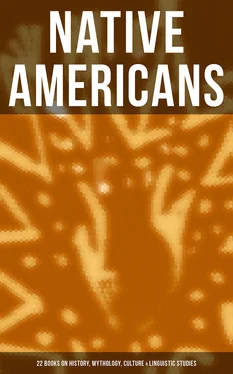3. The United States reaffirm all obligations to the Cherokees arising out of treaty stipulations or legislative acts of the Government.
4. The United States having by article 2 of the treaty with the Comanches and Kiowas of October 18, 1865, set apart for their use and occupation and that of other friendly tribes that portion of the Cherokee domain lying west of 98° W. longitude and south of 37° N. latitude; and having further, by article 16 of Cherokee treaty of July 19, 1866, set apart in effect for the like purpose of settling friendly Indians thereon all the remaining Cherokee domain west of 96° W. longitude, agree to pay to the Cherokees therefor, including the tract known as the "Cherokee strip," in the State of Kansas, and estimated to contain in the aggregate the quantity of 13,768,000 acres, the sum of $3,500,000. This agreement was accompanied with the proviso that the Cherokees should further relinquish to the United States all right and interest in and to that portion of the Cherokee "outlet" embraced within the Pan Handle of Texas, containing about 3,000,000 acres, as well as that portion within New Mexico and Colorado, excepting and reserving, however, all salines west of 99° to the Cherokees.
5. The United States agree to refund to the Cherokees the sum of $500,000 paid by the latter for the tract of "neutral land," under the treaty of 1835, together with 5 per cent. interest from the date of that treaty, and to apply for the use and benefit of the former all moneys accruing from the sale of that tract.
6. The United States agree to ascertain the number of acres of land reserved and owned by the Cherokee Nation in the State of Arkansas, and in States east of the Mississippi River, and to pay to the Cherokees the appraised value thereof.
7. The United States agree to pay all arrears of Cherokee annuities accruing during the war and remaining unpaid.
8. Citizens of the United States having become citizens of the Cherokee Nation, shall not be held to answer before any court of the United States any further than if they were native-born Cherokees. All Cherokees shall be held to answer for any offense committed among themselves within the Cherokee Nation only to the courts of that nation, and for any offense committed without the limits of the nation shall be answerable only in the courts of the United States.
9. The post and reservation of Fort Gibson having been reoccupied by the United States, it is agreed that all Cherokees who purchased lots at the former sale of the military reserve by the Cherokee authorities, after its abandonment by the United States, shall be reimbursed for all losses occasioned by such military reoccupation.
10. The United States shall continue to appoint a superintendent of Indian affairs for the Indian Territory and an agent for the Cherokees.
11. A commission of three persons (two citizens of the United States and one Cherokee) shall be appointed to pass upon and adjudicate all claims of the Cherokee Nation, or its citizens, against the United States, or any of the several States.
12. The powers of the agent provided for by the twenty-second article of the treaty of 1866 to examine the accounts of the Cherokee Nation with the United States are enlarged to include the accounts of individual Cherokees with the United States.
13. All claims against the United States for Cherokee losses through the action of the military authorities of the United States, or from the neglect of the latter to afford the protection to the Cherokees guaranteed by treaty stipulation, are to be examined and reported on by the commission appointed under the eleventh article of this treaty.
14. Full faith and credit shall be given by the United States to the public acts, records, and judicial proceedings of the Cherokee Nation when properly authenticated.
15. Cherokees east of the Mississippi River, who remove within three years to the Cherokee Nation, shall be entitled to all the privileges of citizens thereof. After that date they can only be admitted to citizenship by act of the Cherokee national council.
16. Every Cherokee shall have the free right to sell, ship, or drive to market any of his produce, wares, or live stock without taxation by the United States, or any State, and no license to trade in the Cherokee Nation shall be granted unless approved by the Cherokee council.
17. Fifty thousand dollars shall be allowed for the expenses of the Cherokee delegation in negotiating this treaty, one half to be paid out of their national fund.
18. Executors and administrators of the owners of confiscated property shall have the right, under the third article of the treaty of 1866, to take possession of such property.
19. Twenty-four thousand dollars shall be paid by the Cherokee Nation to the heir of Bluford West, as the value of a saline and improvements of which he was dispossessed.
20. Abrogation is declared of so much of article 7, treaty of 1866, as vests in United States courts jurisdiction of causes arising between citizens of the Cherokee Nation, and transfers such jurisdiction to the Cherokee courts.
21. Provision of the treaty of 1866 relative to freedmen is reaffirmed; the United States guarantee the Cherokees in the possession of their lands and protection from domestic strife, hostile invasions, and aggressions by other Indian tribes or lawless whites.
Boundaries of the Cherokee Domain
Table of Contents
During the proceedings incident to the negotiation of this treaty the question arose as to what constituted the proper western limit of the Cherokee country.
The Cherokees themselves claimed that their territory extended at least as far west as 103° west longitude, being the northeast corner of New Mexico. Their claim was based in part upon the second article of the treaty of 1828, 620the first article of the treaty of 1833, 621the second article of the treaty of 1835, 622and the first article of the treaty of 1846. 623
The treaty of 1828 guaranteed to the Cherokees seven millions of acres of land, and then declared in the following words: "In addition to the seven millions of acres thus provided for, and bounded, the United States further guarantee to the Cherokee Nation a perpetual outlet west, and a free and unmolested use of all the country lying west of the western boundary of the above described limits, and as far west as the sovereignty of the United States and their right of soil extend."
This guarantee was reaffirmed in similar language by the treaties of 1833 and 1835, and the guaranty contained in the treaty of 1835 was reaffirmed by the treaty of 1846. The question, therefore, to be determined was what constituted the extreme western limit of the sovereignty of the United States in that vicinity.
The colony or province of Louisiana had originally belonged to France. In 1762 it was transferred to Spain, but was by Spain retroceded to France by the treaty of 1800. In 1803 the Emperor Napoleon, fearing a war with England and the consequent occupation of the territory by that power, ceded it to the United States, but the boundaries of the cession were very indefinite and, according to Chief Justice Marshall, were couched in terms of "studied ambiguity."
It seems to have been consistently claimed by the United States up to the treaty of 1819 with Spain that the western boundary of the Louisiana purchase extended to the Rio Grande River. The better opinion seemed also to be that it followed up the Rio Grande from the mouth to the mouth of the Pecos, and thence north. By that treaty, however, all dispute concerning boundaries was adjusted and the undefined boundary between Louisiana and Mexico was settled as following up the course of the Sabine River to the Red River; thence by the course of that river to the one hundredth meridian, thence north to the Arkansas River and following the course of that river to the forty-second parallel, and thence west to the Pacific Ocean. By many the position was taken that this treaty was a nudum pactum , and Henry Clay, when it was under consideration in the Senate, introduced a resolution into the House of Representatives declaring that Texas, being a part of the territory of the United States, could not be ceded by the treaty making power to a foreign country, and that the act was not only unauthorized by the Constitution but was void for another reason, viz, that this cession to Spain was in direct conflict with clear and positive stipulations made by us in the treaty with France as to the disposition of the whole territory. Under this theory of the invalidity of the treaty of 1819 the Cherokees claimed the extension of their boundary west of the one hundredth meridian. But, assuming the insufficiency of this claim, they still fortified their title upon another proposition. Mexico succeeded, by the consummation of her independence, to all the territorial rights of Spain in this region. Texas in turn achieved her independence of Mexico in 1836. In March, 1845, Texas became one of the United States, and thus, according to the Cherokee assumption, "the United States again came into possession of that portion of the outlet west of 100°, if indeed it had ever been a part of the territory claimed by Mexico and which by Texan independence she was forced to relinquish. The United States, more than a year after she had come into possession of the country now claimed by the Cherokees, reaffirmed the grant to them, that is to say, by the treaty of August 17, 1846."
Читать дальше












